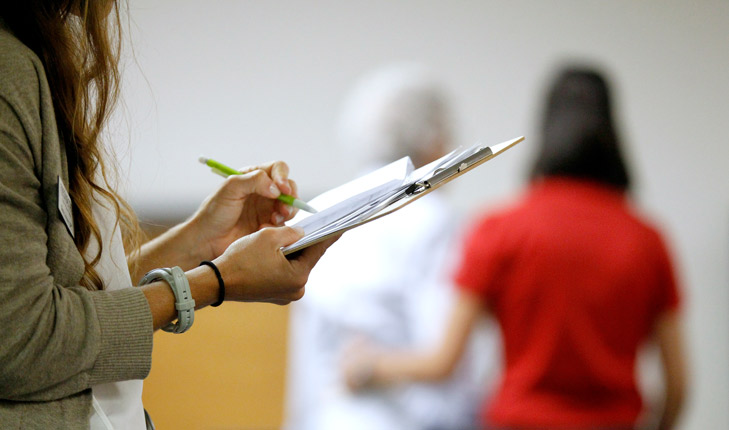A routine trip to the grocery store changed the course of Norma Gardner’s life. The 80-year-old Fresnan was in the medicine aisle when she kneeled down to reach for something on the bottom shelf and soon realized she could not get back up on her own.
“It took 15 minutes, but I was finally able to get back up with the assistance of a very nice employee there,” Gardner said. “That really worries me. If I bend down, will I be able to get back up again?”
Gardner’s harrowing experience prompted her to attend the Senior Awareness Fall Education (S.A.F.E.) Central Valley Coalition Balance Screening earlier this fall. She saw an ad in the local senior living section of The Fresno Bee, and took it as a sign that she needed to get help.
The goal of the S.A.F.E. Program, a partnership between Fresno State and California Health Sciences University, is to increase awareness of the physical, psychological and economic impact of falls on individuals and to train current and future health professionals about the importance of early screenings and intervention for older adults, age 55 and over.
“According to the National Council on Aging, 1 in 4 Americans over the age of 65 fall each year and 20% to 30% of those who fall will suffer a serious injury,” said Dr. Leslie Zarrinkhameh, assistant professor and director of clinical education in the Department of Physical Therapy at Fresno State. “In Fresno and Madera counties, the Agency on Aging estimates that about 16% of adults over the age of 60 are considered low-income and 15% live in geographically isolated areas. With that in mind, the ability to provide free, comprehensive, multidisciplinary fall risk factor assessments to the community is a necessity.”
Since 2007, the program has assisted nearly 700 older adults from around Fresno County.
The program not only helps the community, but it helps students learn how to work together as a health care team. Over 500 undergraduate and graduate students across four health care disciplines and two institutions have volunteered or participated thus far.
Second-year Doctor of Physical Therapy student Christine Lopez, of Temecula, said the experience learning from, and with, others in the health care fields has been eye opening.
“Learning from the other students and getting a taste of what they do in the real world has been a great experience,” Lopez said. “As an interdisciplinary team, we are able to discuss with each other and with the client, the proper steps and plan they should take in order for them to be safe at home and in the community.”
Those who attend the comprehensive balance screening are treated and assessed by a team of students majoring in nursing, physical therapy, kinesiology and pharmacy.
Nursing students complete the medical screening of the client, including discussing their health history, as well as taking blood pressure and vision tests.
Next, kinesiology students perform strength testing for agility, and physical therapy students complete a variety of tests that screen for gait, strength and balance, including sensory and motor impairments.
Afterwards, pharmacy students go over medications, making sure the client understands the medication and the side effects that could potentially lead to falling.
Lastly, the entire interdisciplinary group comes together as a team to assess the client and offer solutions and tips to take home.
Throughout the semester, nursing students follow up with the clients and provide individualized home safety visits.
For Gardner, who has a history of osteoporosis and falls in her family, the experience of receiving services from a cohesive health care team has proven beneficial.
“It’s wonderful,” Gardner said. “The students showed me exactly what I need to improve on and have shown me how I can be stronger. I have a fear of falling because my mother had very bad osteoporosis and had fallen and broken her hip. My late husband passed away last year shortly after a fall, so what that taught me is that a fall could be the beginning of the end, if not treated.”
The next screening will be held on Thursday, Nov. 7, at California Health Sciences University and is by appointment only. To learn more or to register for future screenings, contact the Department of Physical Therapy at 559.278.2625.
The S.A.F.E. program relies on private financial support, such as funds raised from Fresno State’s annual Day of Giving, to operate. For questions about how to support S.A.F.E., contact Amy Millis at amillis@csufresno.edu or 559.278.5590.
![]()
Fresno State’s third annual 24-hour, online Day of Giving will be Nov. 7. Each gift on this day, no matter how large or small, will directly support student success. Visit dayofgiving.fresnostate.edu to learn more.





